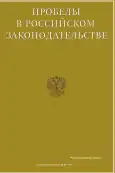Separate Problems of Practical Application of the Norms of Law Containing Accessory Obligations
- Авторлар: Tsukanova E.Y.1, Trukhan R.P.1
-
Мекемелер:
- Belgorod State National Research University
- Шығарылым: Том 16, № 7 (2023)
- Беттер: 18-23
- Бөлім: Theoretical and Historical Legal Sciences
- URL: https://journal-vniispk.ru/2072-3164/article/view/249801
- EDN: https://elibrary.ru/RNWQUX
- ID: 249801
Дәйексөз келтіру
Аннотация
This article examines the law enforcement practice, the application of legal norms containing accessory obligations. The relevance of the topic of the article is determined by the fact that the terms "accessory" and "accessory obligation" are not used in Russian legislation. In this connection, the analysis of the concept and essence of accessory obligations can be based, inter alia, on the doctrinal interpretation of the concept in question, its historical and legal roots, as well as its use in a particular context in the acts of national judicial authorities. The acts of the higher courts, law enforcement practice are considered. Conclusions are drawn: The precedent created by the definition of 14.06.2016 No. 308-ES16-1443 in case No. A61-2409/2010 has not yet been extended by analogy to similar legal relations in which the main obligation is terminated or changed regardless of the will of the creditor, by virtue of the law. Contradictory judicial arbitration practice exacerbates the original problem – the absence, both in legislation and in judicial practice itself, of a definition and signs of an accessory obligation. At the same time, it should not be denied that it is judicial practice that will largely fill the existing niche today, which has become a consequence of the incompleteness of legislative regulation.
Негізгі сөздер
Толық мәтін
##article.viewOnOriginalSite##Авторлар туралы
Elena Tsukanova
Belgorod State National Research University
Хат алмасуға жауапты Автор.
Email: tsukanova@bsu.edu.ru
ORCID iD: 0000-0003-4072-8218
SPIN-код: 9132-6953
Scopus Author ID: 267475
Dr.Sci.(Law), Associate Professor, Professor of the Department of Civil Law and Procedure, Acting Vice-Rector for Educational and Youth Policy
Ресей, BelgorodRoman Trukhan
Belgorod State National Research University
Email: trukhan.roma@bk.ru
SPIN-код: 6612-7648
Scopus Author ID: 1218900
competitor
Ресей, BelgorodӘдебиет тізімі
- The Town-planning Code of the Russian Federation of 29.12.2004 N 190-FZ (ed. of 04.08.2023) (with amendments and additions, intro. effective from 01.09.2023) // Collection of Legislation of the Russian Federation. 2005. N 1 (Part 1). Article 16.
- The Civil Code of the Russian Federation (Part one) of 30.11.1994 N 51-FZ (ed. of 24.07.2023) (with amendments and additions, intro. effective from 01.10.2023) // Collection of legislation of the Russian Federation. 1994. N 32. Art. 3301.
- Federal Law No. 372-FZ of 03.07.2016 (as amended on 12/28/2016) "On Amendments to the Urban Planning Code of the Russian Federation and Certain Legislative Acts of the Russian Federation" // Collection of Legislation of the Russian Federation. 2016. N 27 (Part II). Article 4305.
- Resolution of the Plenum of the Supreme Arbitration Court of the Russian Federation of 12.07.2012 N 42 (ed. of 29.06.2023) "On some issues of dispute resolution related to surety" // Economics and Life. N 34. 31.08.2012.
- Determination of the Judicial Board for Economic Disputes of the Supreme Court of the Russian Federation of 24.09.2014 in the case N 305-ES14-1200, A40-28131/2013 // SPS "Consultant Plus".
- Determination of the Judicial Board for Economic Disputes of the Supreme Court of the Russian Federation dated 06/14/2016 No. 308-ES16-1443 in case No. A61-2409/2010 // SPS "Consultant Plus".
- Bevzenko R.S. Accessory of security obligations: European legal tradition and Russian practice // Bulletin of Civil Law. 2012. N 5. p. 4 - 36.
- Kochergin P.V. Weakening of the accessory of surety in the Resolution of the Plenum of the Supreme Arbitration Court of the Russian Federation No. 42 dated 12.07.2012 // Bulletin of the Federal Arbitration Court of the North Caucasus District. 2012. No. 4 (10). pp. 83-93.
- Leskova Yu.G. Key changes of the institute of self-regulation of construction activity: some questions of theory and practice // Laws of Russia: experience, analysis, practice. 2017. No. 7. p. 63.
- Novikov K.A. Accessory of security obligations and security-oriented rights // Bulletin of Economic Justice of the Russian Federation. 2015. N 1. pp. 107 - 120.
- Ponamarev A.M. On the issue of compensation funds of self-regulating organizations in the field of construction // Civil law. 2018. N 6. pp. 28 - 31.
- Saifullin R.I. Weakening of the accessory nature of surety and pledge. Comment to the Definition of the Judicial Board for Economic Disputes of the Supreme Court of the Russian Federation dated 14.06.2016 No. 308-ES16-1443 // Bulletin of Economic Justice of the Russian Federation. 2016. No. 8. pp. 25-30.
Қосымша файлдар








